Several years ago, one of our kids was majorly struggling with learning to read, despite 3 years of intense professional Orton-Gillingham (OG) reading instruction. In fact, at 11-years-old, he was still struggling to do much more than sound out three letter words! It certainly appeared that this well regarded method of teaching reading to kids with dyslexia, Orton-Gillingham, wasn’t enough to help him.
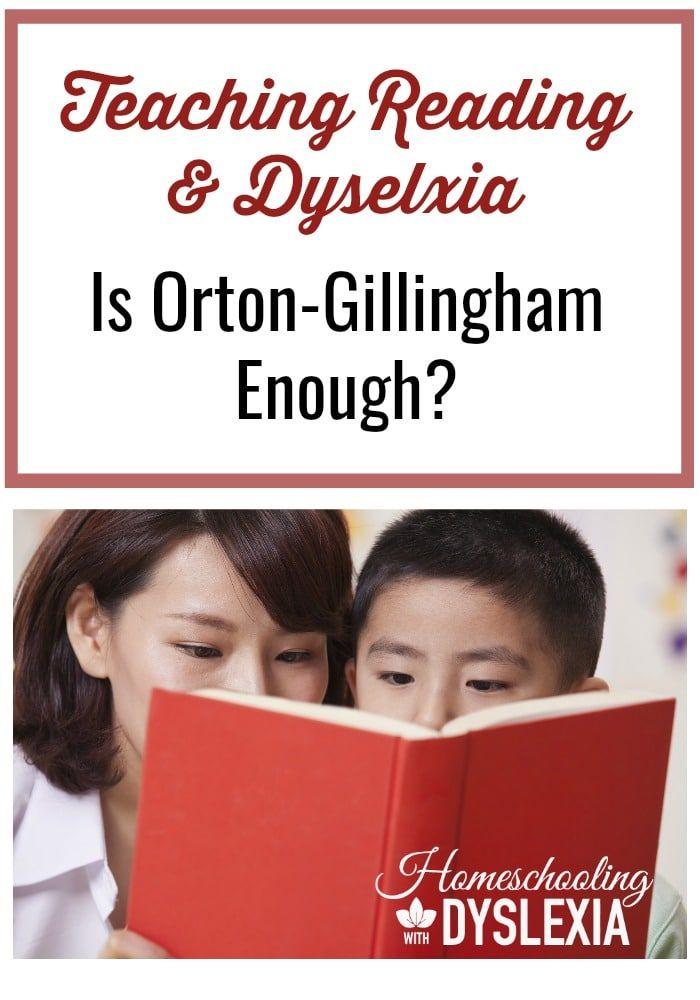
That was when we moved him from his OG tutor to an educational therapist. This therapist not only taught reading in a systematic and explicit way as prescribed by the OG approach, she also began to work on the underlying weaknesses of his learning struggles: working memory, visual processing, auditory processing, and even executive function skills.
That year his reading (and learning) took off and was a major turning point in his life. I’m sure many of you can relate to the emotional turmoil our kids experience after years of extreme difficulty in school – especially as they get older. Our son was frustrated, angry, and losing confidence fast.
I often hear parents in online forums, debating the effectiveness of one OG reading program or another – stating that a particular program didn’t work for their child. It’s not that OG isn’t working, it’s that the underlying weaknesses are making the program less effective.
Why educational therapy works
It’s true that our son was more profoundly dyslexic. You can read more about what it means to be profoundly dyslexic here. His psycho-educational testing revealed alarmingly low processing speeds, both auditory and visual, as well as low working memory. He experienced success with educational therapy because he spent at least half of each session working on strengthening these underlying weaknesses.
The educational therapist he saw (and three other of our kids as well) is called NILD and I highly recommend it! The only drawback to NILD is that is can be expensive for families, especially single-income homeschool families.
The exciting news is that there are activities that strengthen processing and memory that can be done at home!
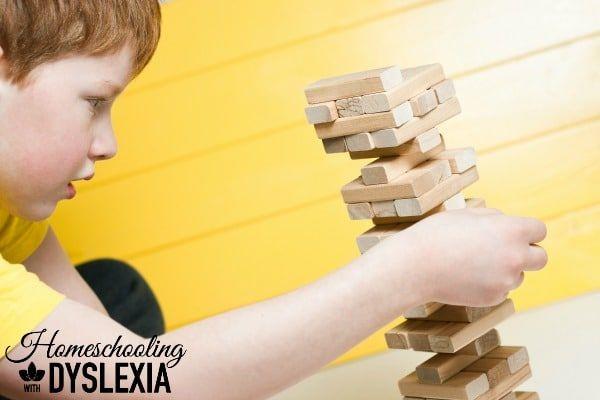
Strengthening Processing and Memory Skills in Kids with Learning Struggles
Do you have a child who is struggling to make sufficient progress with reading?
Are you consistently teaching with a research-based Orton Gillingham reading program but progress is painfully slow?
Would you like to learn techniques to strengthen the underlying areas of weakness that are causing slow progress?
If you have a child who is making slow progress like our son, or maybe an older child who is still significantly behind, practicing activities that strengthen working memory, auditory and visual processing, and executive functioning skills for even 10-15 minutes a day can have a significant impact on the effectiveness of your teaching.
It is important to understand the role of these exercises. These exercises and targeted activities are not a cure for your child’s reading and learning struggles. Rather they are a simple way to help improve the underlying weaknesses caused by slow processing and low working memory which in turn makes learning to read, write, and spell easier.
Resources for Processing, Memory, and Executive Function Weakness
I created my new set of online parent courses to share this exciting information with you. Learn about what processing, memory, and executive functions are, how to recognize the signs of weaknesses in your kids, which accommodations are the most effective, and best of all – how to implement simple exercises at home that can help strengthen these areas of weakness in just 10-15 minutes a day.
For even more understanding and tons of activities to use at home, purchase my Processing, Memory, and Executive Function Bundle of online parent courses.
What’s Included in the Processing, Memory and Executive Function Bundle
I’m excited to announce the release of this new bundle of online parent education courses! Keep reading to see what is included and scroll to the bottom of this post to learn about some fun launch week bonuses!
Get my 3 new parent education classes:
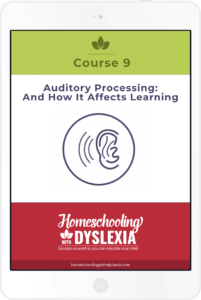 Auditory Processing: And How it Affects Learning
Auditory Processing: And How it Affects Learning
Do you have a child who finds it hard to follow spoken directions, especially multi-step directions? Do have they have trouble ‘getting’ jokes or riddles or other figurative language such as metaphors and similes? Do they have trouble remembering what was read or heard? It may be due to a weakness in auditory processing – also called Auditory Processing Disorder.
In this online parent course, you will learn:
- What auditory processing is and what Auditory Processing Disorder is
- How weaknesses in auditory processing affects learning, communication, social skills, and everyday life skills
- Specific types of auditory processing issues
- Signs of Auditory Processing Disorder in both in academic and real life situations
- How Auditory Processing Disorder is diagnosed
- The connection between Auditory Processing Disorder and other learning struggles like Dyslexia and ADHD
- Treatments for Auditory Processing Disorder
- Strategies for helping kids with Auditory Processing Disorder
- Best accommodations for Auditory Processing Disorder
- Assistive technology that helps with Auditory Processing Disorder
Do you have a child who is easily distracted by too much visual information, does a sloppy job with visual tasks, has difficulty writing within lines or margins, or frequently bumps into things? It may a visual processing weakness – also known as Visual Processing Disorder.
In this online parent course you will learn:
- To understand what processing issues are
- The definition of Visual Processing Disorder
- The 8 areas of visual processing weakness that impact Visual Processing Disorder
- How to know if your child’s issues are vision-based or a processing issue
- How to get a diagnosis
- Symptoms and Signs of visual processing issues
- Treatments for Visual Processing Disorder
- Types of therapies and interventions to help kids with visual processing weaknesses
- Tons of activities for building visual processing skills
- Best accommodations for kids with Visual Processing Disorder
- Best assistive technology for Visual Processing Disorder
Working Memory: And How it Affects Learning
Do you have a child who has trouble remembering facts and procedures such as new vocabulary or mathematical procedures? Do they have trouble following directions despite repeated instructions? Do they have difficulty starting work and staying on task? Do they frequently loose track of belongings? It may be a working memory weakness.
In this online parent course you will learn:
- What working memory is
- What working memory weaknesses are and how they affect learning
- How working memory develops
- What causes working memory weakness (and what doesn’t)
- Signs of working memory weakness
- The connection between low working memory and other learning struggles like ADHD, dyslexia, and processing disorders
- How working memory affects learning
- How to test for working memory ability
- How to help kids with working memory weaknesses
- Accommodations that help with weak working memory
- Assistive technology for working memory
- Strategies for boosting memory and encouraging deeper understanding
PLUS free access to one of my meatiest courses to date:
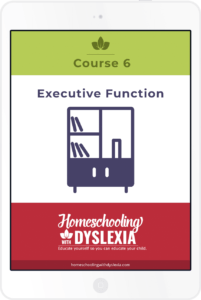 Executive Function: Teaching Your Dyslexic Child to Organize Their Thoughts, Personal Space, and Time.
Executive Function: Teaching Your Dyslexic Child to Organize Their Thoughts, Personal Space, and Time.
Do you have a child who is hopelessly unorganized? Can never find their pack packs, folders or soccer cleats? Oftentimes these kids are not just disorganized with their belongings but also with their thoughts. These are the kids who have difficulty starting projects and once they’ve started them, often lack what it takes to complete them. You may be interested to know that there is a name for this type of disorganization – executive function – or in this case a lack of executive function skills.
In this class, you will learn:
- what executive function is and how it develops
- signs of executive function weakness
- myths about kids (and adults) with executive function weakness
- how executive function weaknesses can affect learning and academics, behavior and emotions, and social skills and relationships
- targeted strategies to help kids learn to organize their time, thoughts, and belongings
- strategies to help kids learn to prioritize tasks
- strategies to help kids learn how to mange their time management
- strategies to help kids learn self-control
- and strategies to help kids develop better social skills
You can pay an executive function coach to teach these things to your kids or you can learn to teach them yourself!
How my Online Parent Courses Work
All parent courses come with:
- online video instruction – approximately 1 hour each
- a downloadable audio file
- a printable pdf outline for easier note-taking
- a list of relevant links and resources
- an invitation to our private Facebook Page for course members only
These online courses come to you in both video and audio formats. All courses include a printable outline for note-taking and a downloadable audio recording of the class. You can listen any time, anywhere (and your spouse can listen too.)
We are also offering support in a private Facebook group for class members only.
You’ll receive audio MP3s, PDF outlines, links to resources and access to small group encouragement. All courses are based on research-based methods of teaching with plethora of my own unique, personal experience teaching my own 7 kids with learning struggles over the past 20+ years.
This is an opportunity for you to learn what has taken me many years to learn. You could use trial and error to learn what this class will teach you, or you can sign up and learn strategies to help your kids learn more efficiently today!

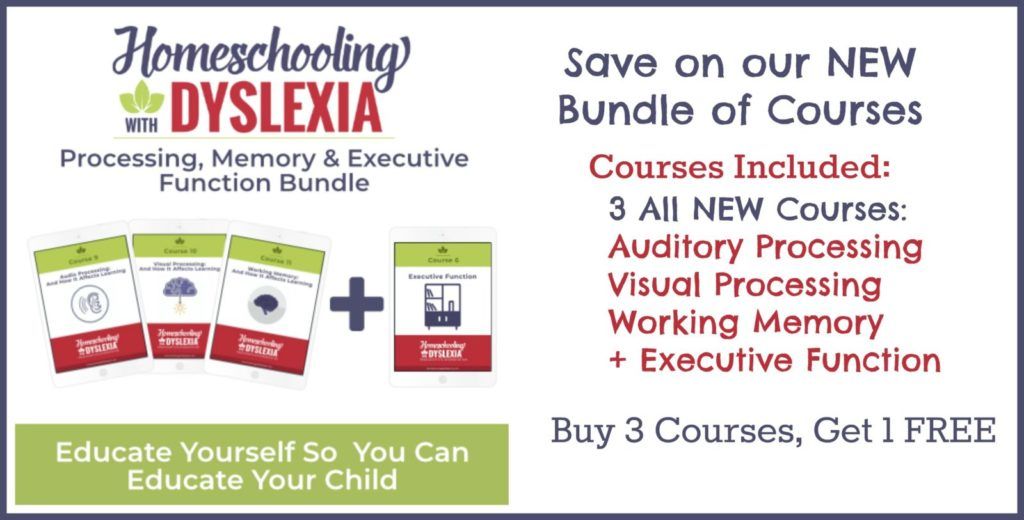
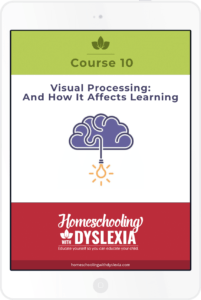
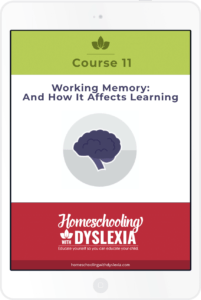





Thank you Marianne,
My son also was diagnose as profoundly dyslexic in 2013 by the Brazilian Association of Dyslexic. I also had worked with him for many years with a O-G curriculum . We also found out that he had auditory processing issues . After 2 years of therapy to help with the auditory processing , finally he started to read better and made amazing progress with reading. We still struggle with spelling , but seems that his memory is much better and he is able to keep what he learns . We are a living prove to what you share in your post. I think is valid to address the weak areas and help them to succeed in their hard work . Thank you again for sharing all your finding with us.
I’m excited for these learning opportunities! I’m a dyslexia consultant and OG reading instructor that works in coordination with a local school district, as well as having private clients. I’ve found that the school district exhausts all of thier in house resources before refering students to me (often 4-8th grade). Most often, the students’ dyslexia struggles are extremely signficant and layered with issues like auditory processing, exectutive function, phonemic awarenes, working memory, etc. Seeing them 2x a week makes progress so very slow. I’m hoping that having these new tools will help fine tune the instruction for each student so that progress can be seen sooner and students can start to feel a sense of accomplishment and possibility. Thanks for sharing these and all of your experiences that went into them!